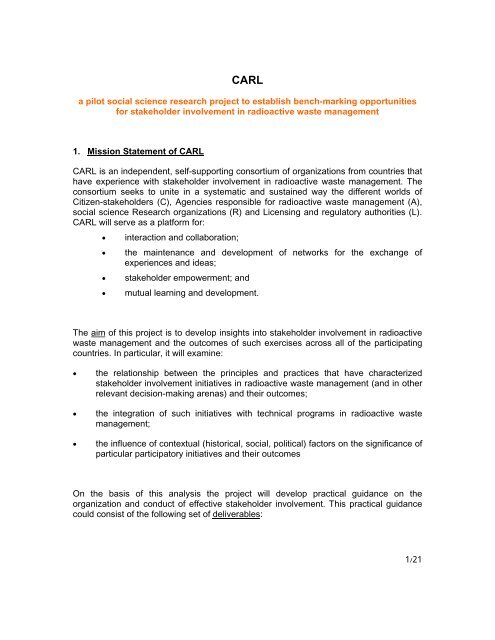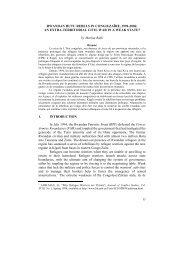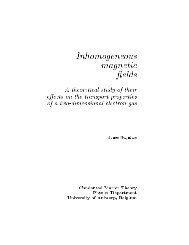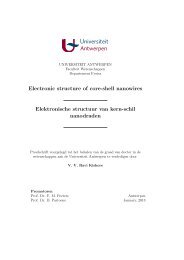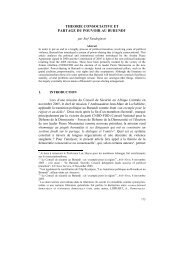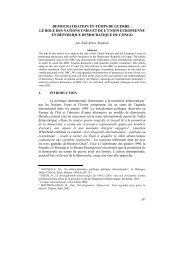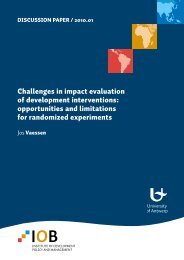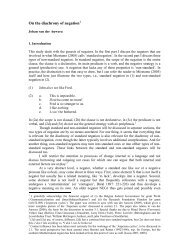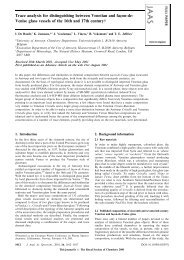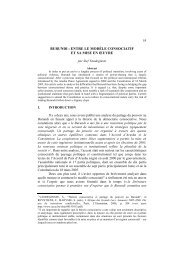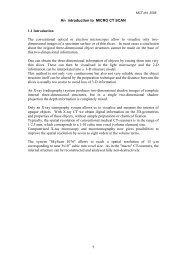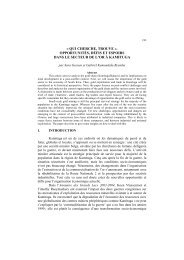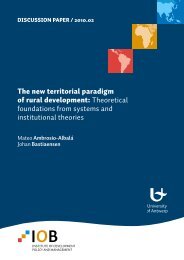Carl proposal
Carl proposal
Carl proposal
You also want an ePaper? Increase the reach of your titles
YUMPU automatically turns print PDFs into web optimized ePapers that Google loves.
CARLa pilot social science research project to establish bench-marking opportunitiesfor stakeholder involvement in radioactive waste management1. Mission Statement of CARLCARL is an independent, self-supporting consortium of organizations from countries thathave experience with stakeholder involvement in radioactive waste management. Theconsortium seeks to unite in a systematic and sustained way the different worlds ofCitizen-stakeholders (C), Agencies responsible for radioactive waste management (A),social science Research organizations (R) and Licensing and regulatory authorities (L).CARL will serve as a platform for:••••interaction and collaboration;the maintenance and development of networks for the exchange ofexperiences and ideas;stakeholder empowerment; andmutual learning and development.The aim of this project is to develop insights into stakeholder involvement in radioactivewaste management and the outcomes of such exercises across all of the participatingcountries. In particular, it will examine:•••the relationship between the principles and practices that have characterizedstakeholder involvement initiatives in radioactive waste management (and in otherrelevant decision-making arenas) and their outcomes;the integration of such initiatives with technical programs in radioactive wastemanagement;the influence of contextual (historical, social, political) factors on the significance ofparticular participatory initiatives and their outcomesOn the basis of this analysis the project will develop practical guidance on theorganization and conduct of effective stakeholder involvement. This practical guidancecould consist of the following set of deliverables:1/21
<strong>Carl</strong> – a social science research project Proposal 11/10/05••••fundamental insights into contextual factors necessary to understand thesignificance of particular participatory initiatives and their outcomes;a framework for a peer-review system for social programs and their integration withthe technical programs in radioactive waste management;guidance for reviewing this kind of exercise;a set of fundamentals and principles (based on the aforementioned insights)according to which best practices in stakeholder involvement could be established.2. Why the need for this pilot project ?The management of radioactive waste is an activity that explicitly calls for a (highly)technological approach. Safely dealing with radioactive waste brings together amultitude of scientific disciplines, all specializing in particular aspects of the waste issue.Since it is such a highly complex and delicate matter, the development of knowledge andtechnology concerning the handling ((re)processing, packaging, transporting, storage,disposal, …) of radioactive waste has become an international exercise. Over the years,an extensive system of peer review, exchanging expertise and collaboration in trainingand fundamental research activities has been set up. Waste managers all over the worldcan now rely on an extensive resource to develop and review their technical andresearch programs, their policies, plans and designs. This international arena for benchmarking,standards setting and exchange of experience and knowledge has shown itsmerits in advancing the “state of the art” in radioactive waste management. Wellrespected international organization such as the UN’s International Atomic EnergyAgency and the OECD’s Nuclear Energy Agency have been vital in the creation andsupport of this “international knowledge base”. Within the European Union, theDirectorate-General for Energy and Transport, acting on the legal bases of theEURATOM-treaty, serves the same purpose by supporting multilateral researchactivities, training and exchange initiatives. Particularly the guidelines and principles putforward by the IAEA form the firm basis for an international framework of peersreviewing technical programs.These existing networks focus mainly, if not exclusively, on technical matters. However,managing radioactive waste and managing it safely cannot be confined to science andtechnology. It is not a mere technical matter, it is just as much a societal matter. Theresponsibility of agencies responsible for the management of radioactive waste goesbeyond handling the waste. They also have responsibilities towards the natural andsocial environment in which they operate. The locally effected communities living withthe waste are not to be treated as a troublesome lot that stands in the way of dealingwith the waste properly (NIMBY reactions, not considering the general public’s interest ,etc. …). They are just as much part of the solution as the technical programs are. How todeal with the social aspects (these being understood as every non-technical aspect) ofradioactive waste management is one of the main concerns of most waste management2/21
<strong>Carl</strong> – a social science research project Proposal 11/10/05agencies today. More than before, agencies have to engage in a sustained dialogue withdiverse stakeholders to look for shared problem definitions and mutual agreement onhow to address the issues at hand. Since this is a highly complicated (though nottechnical) and delicate matter, waste managers touch base with their colleagues abroad.Currently, this takes places mainly in (the margins of) the well-established arena for theexchange, comparison and evaluation of technical information. Few initiatives haveconcentrated solely and explicitly on the social and participatory aspects of radioactivewaste management.The creation of an international forum on the societal aspects of radioactive wastemanagement is nevertheless essential to give these aspects the weight and recognitionthey deserve, and to counterbalance the one-sided technical approach prevalent in thepast. Understanding society is just as much needed in radioactive waste management,as is understanding for instance geology or radioactivity. Both technical and societalaspects should be investigated thoroughly. In addition to the existing networks fortechnical knowledge, radioactive waste managers, as well as all other stakeholders,would benefit from the creation of a network for bench-marking, fundamental researchactivityand the exchange of knowledge and experience on societal matters. All partiesinvolved in this <strong>proposal</strong> consider this a conditio sine qua non to obtain an integratedapproach for the long term management of radioactive waste. They accordinglyrecognize the need to develop both a specific framework and a particular arena foranalyzing, comparing and reviewing stakeholder involvement programs in radioactivewaste management.3. Why CARL would be an innovative initiativeIn recent years several international forums engaged in the exchange of experienceswith stakeholder involvement in the context of radioactive waste management. As anexample, we mention the Forum on stakeholder confidence (FSC) organized by theRadioactive Waste Management Committee of the Nuclear Energy Agency and theCOWAM (I) concerted action supported by the European Commission DG RTD. In thisway, practitioners of stakeholder involvement in public decision making created anetwork that can be put to good use. These initiatives, however, have not moved beyondthe stage of discussing previous experiences. Several research projects like RISCOM 1and the COMPAS 2 project (to name just a few) have been set up to record howdecisions are made about radioactive waste management, to consider best practice in1 Kjell Andersson, Raul Espejo and Clas-Otto Wene (1998) Building channels for transparent riskassessment, RISCOM Final Report, SKI Report 98:6.Kjell Andersson e.a. (2003) Transparency and Public Participation in Radioactive WasteManagement, RISCOM II Final Report (http://www.karinta-konsult.se/RISCOM.htm).2 Project funded by the European Community under the ‘Nuclear Fission’ Programme (5 thEuratom Framework Programme 1998 – 2002): summary report issued 23-11-2003.3/21
<strong>Carl</strong> – a social science research project Proposal 11/10/05stakeholder involvement, to develop and test various mechanisms to achieve this, and todraw lessons from various successes and failures. Out of the RISCOM project also rosethe VALDOR (VALues in Decisions On Risk) symposia and summer schools held inStockholm. This fruitful initiative was set up to look at how “moral and ethical values heldby individuals and society” interrelate with “factual considerations” in risk assessment 3 .Each of these initiatives show that the importance of societal issues in radioactive wastemanagement has been recognized. The initiators of the CARL project acknowledge thework that has been done so far, but also consider it to be important to move beyond astage of pure networking. For the agencies and the other stakeholders, in particular thepublic concerned, there is indeed a need to go further than simply comparing eachcountries efforts, and patting each others on the backs. The time has come to analyze,systematize and legitimize the ad hoc procedures of stakeholder involvement.Comparative research projects on stakeholder issues and initiatives often aim atdeveloping toolkits for policymakers. This tends to insinuate that there exists a map toguide policymakers to the treasure. The “map” being a set of social parameters or a listof issues to tackle, and the “treasure” society accepting the technical expert’s solutionsto the waste problem or a community willing to host a repository facility. However, just asthere is not one possible technique to deal with radioactive waste (some countries vitrifytheir high level waste, some don’t; the Swedes want to dispose of it in their bedrock, theBelgians in their clay; …), so there is not one right way or one right process to involvethe public concerned. Social scientists cannot perform magic. What they can do - andwhich is the explicit goal of the CARL project - is provide insights into the “why and how”,into the processual and contextual factors (political, institutional, cultural, historical, etc.)that can be important to understand the significance of a particular activity orparticipatory initiative and its outcomes. In addition to examining the official, formalizedaspects of ongoing participatory initiatives, social science research can also help toidentify and evaluate the significance of informal processes that inevitably accompanyand influence formal decision making processes. To meet the requirements for widerstakeholder and public participation, both in legal and other terms, new participatoryapproaches, such as consensus conferences, focus groups and even co-decisionmaking, have emerged. Their aim is to capture preferred values through the creation ofsmall public spaces where issues are discussed. Broad frameworks for such processesinclude Environmental Impact Assessment (EIA), Strategic Environmental Assessment(SEA) and Participatory Technology Assessment (PTA). There is no lack of ideas orinitiatives for participation, but there is a need for a systematic framework to describeand evaluate them. This would allow us to understand how they fit into a larger context,and how to select them for a given decision task. Currently, the efforts to describe andevaluate them seem to be fragmented between problem areas and countries and thereis a need for a systematic framework with a topology and evaluation criteria. Much canbe learned from cross-fertilization, and this project can address issues at a generic levelwhile learning from, and giving feedback to, different countries.3 VALDOR: A Symposium in the RISCOM Programme Addressing Transparency in RiskAssessment and Decision Making. Stockholm, Sweden, 13-17 June, 1999.4/21
<strong>Carl</strong> – a social science research project Proposal 11/10/05It is therefore the intent of the CARL project to elaborate a cross-national descriptive andevaluative framework. To this purpose, the social sciences research within the projectwill aim specifically at examining the wider processes within which participatoryinitiatives take place and could be considered to “succeed” or “fail”. This will be donethrough:- recording the legal framework of formal national and international requirementsfor stakeholder involvement in decision making relating to radioactive wastemanagement (phase 1);- developing an analytical framework based on the dimensions and factors thatsocial sciences theory claims or previous studies have shown to be decisive or toplay an important role in opening up decision making processes to a broaderpublic (some of these are well known, others are more hidden and still need to beinvestigated thoroughly) (phase 1);- conducting national case studies to develop a detailed understanding of:o the history, culture and experience of stakeholder involvement in theparticipating countries,othe informal elements that influence the formal decision makingframework,o the interface and linkage between the technical and social aspects ofradioactive waste management (phase 2);- investigating the desires and requirements of different stakeholders forinvolvement in the decision making process (phase 2);- integrating all of these elements to develop indicators that could show andimprove the quality, robustness and sustainability of decisions concerningradioactive waste management within each participating country (phase 3).The research output will then serve as a basis for developing a framework to make thisinformation, as well as peoples experiences with particular participatory initiatives,accessible, exchangeable and comparable. The CARL core group will subsequentlyserve as a “peer-review board” that uses the framework to look at participatory programsin all of the participating countries, thus testing the frameworks potential to be used asguidance for reviewing the integration of participatory initiatives with the technicalprograms and the possibility to derive from it a generally applicable set of fundamentalsand principles on best practices.5/21
<strong>Carl</strong> – a social science research project Proposal 11/10/054. The partners in CARLAn additional reason why CARL would be an innovative initiative, is the integration ofdifferent types of stakeholder groups (the C, A and L partners) in the consortium.Although mainly funded by the radioactive waste management agencies (the Apartners), citizen-stakeholders and the licensing and regulatory agencies will also beactively involved in the project. The research will rely on the input of all thesestakeholder groups and the particular research items to be addressed will be chosen inview of the demands of all consortium members (see also work plan, phase 3). Asdifferent stakeholder groups (RWM agencies, local citizens, national politicians,regulators, …) have different demands from a participatory process, one of the maintasks of the CARL research, will be to identify these different needs and to explorepossibilities to integrate them in such a way that a particular participatory process couldbe beneficial to all parties involved.Bellow a short description of the situation in Sweden, Belgium and the United Kingdom,the three countries that have taken the initiative to start the CARL project. However briefthese descriptions, they already illustrate the importance of the contextual factors thisresearch project aims to investigate. The clear difference between the role of the EIAprocess in these three countries (a formal one in Sweden, a more informal one inBelgium and its non existence in the UK) provides just one example of a basis for fruitfulcomparative analysis.SwedenToday, site investigations are conducted in the two municipalities Oskarshamn andÖsthammar in order to determine whether the sites are good enough to host a finalrepository for (high-level) radioactive waste. Both municipalities agreed to participate ona voluntary basis after eight years of feasibility studies in eight differentmunicipalities. The site investigations started in the summer 2002 and are planned to becompleted within five years. They include an extended drilling program to assess thequality of the bedrock.From the early 1990s the siting strategy of SKB - the Swedish nuclear fuel and wastemanagement company - has been directed towards achieving local acceptance, out ofregard for the existence of local powers of veto at the municipal level. This made itnecessary to pay serious attention to the interests and opinions of local citizens and theirrepresentatives and involve them closely in the program. Public involvement is mainlyinformal in character: groups are asked by the authorities to give their opinions, but thepossibilities of appealing a decision are limited. In the Swedish Environmental Code, inforce since 1999, it is prescribed that an application for a permit for activities which havean impact on the environment must include an environmental impact assessment - EIA.This should give a comprehensive overview of the impacts on the environment andhuman health as well as on the conservation of natural resources of a planned facility,activity or measure. Concerning a final repository for nuclear waste the Code states thatextended consultations are needed.6/21
<strong>Carl</strong> – a social science research project Proposal 11/10/05However, contrary to all focus on inclusive decision making and public consultations,there is a risk that a narrow framing of the waste problem will be strengthened during thesite investigations. This could happen if SKB starts focusing too much on what they wantto achieve, and becomes overconfident about the possibility to find a good solution,built on a still highly fragile interface between experts and citizens. To counterbalancethis possible threat to the decision making process and to make the process moresustainable and socially robust, the effected municipalities and their citizens need to beable to influence the program as well. Therefore, an important question is whether theEIA process can be used to strengthen democracy and encourage citizens' participationin the decision-making process or whether it is more used as a strategic arena for SKB,or other actors, to implement a final repository.In the CARL project we will follow and analyze the initiatives taken by engaged actors inrelation to the formal processes of EIA in the two municipalities Oskarshamn andÖsthammar. The extended consultations, part of EIA, are expected to be the mostdeveloped ever carried out in Sweden. From a social science perspective, theseconsultations are an interesting test-site to study the possible development of engagedcitizens as well as socially competent experts. From a practical perspective, theconsultations are a tool which should contribute to this development. The EIA processesare to be studied and evaluated from a deliberative perspective, and we also plan tointeract with them (giving feed back based on our evaluation) in order to strengthen theirdeliberative character. This study on the EIA process could be highly relevant in order toshape a more robust siting process resulting in robust decisions, based on an improvedview on the important role of citizens in dealing with complicated science-based issuesin a technological society, leading to better communication between different groups andthe improvement of mutual processes of understanding.Key players: SKB (A), municipalities of Oskarshamn and Östhammar (C), SSI, Swedishradiation protection authority and SKI, Swedish nuclear power inspectorate (L).Research teams: University of Umeå, Department of Culture and Media and Universityof Göteborg, Section of Science and Technology Studies.BelgiumIn recent years, experience was build on integrating technical and social programs forthe management of low- and intermediate-level radioactive waste. An intensive andexplicitly bottom-up participatory program was set up on a voluntary basis in fourpotential host communities (Dessel, Mol, Fleurus and Farciennes). Negotiations betweenONDRAF-NIRAS, the government agency responsible for the management of radioactivewaste, and the local stakeholders have now reached the stage where decisions will bemade locally on whether to step forward as a real candidate to host a final repository forlow-level waste.Traditionally, decision making process in Belgium (both on federal and regional level)tend to be highly centralized and municipalities have no formal right to veto. It will7/21
<strong>Carl</strong> – a social science research project Proposal 11/10/05therefore be of great interest to see how other decision making bodies on different levelswill respond to this “reversing the initiative”. Particularly the local stakeholders currentlyinvolved in the program are eager to consolidate their position of “co-owners” of thedeveloped repository project. Thus far, the interface between experts and citizens hasproven to be quite robust, but like in Sweden, the sustainability of the fragile relationbetween waste manager and the participating communities will be put to the test in themonths and years to come. Here too, the risk exists that one might count too much onhaving the solution within reach, which could lead to a narrowing down of the framing ofthe problem once again. One of the questions here, will be whether the existing process(although formally not a real EIA process) has been able to empower the localcommunities in a more sustainable way.As for the management of the high-level waste, ONDRAF-NIRAS has been focusing mainlyon its technical program. Given the advanced state of this technical program and the factthat two of the municipalities (Mol and Dessel) involved in the discussions on LLW alsoare important stakeholders concerning the HLW (as they currently host temporarystorage buildings), an integration of this technical program with a social program is(urgently) called for. Green light for starting with a specific social program for HLW hasonly recently been given by the Minister of Energy. In the CARL project the developmentof this new program will be closely followed, listing both formal and informal contextualfactors that shape the process. Of particular interest will be to analyze the way in whichthe local stakeholders will be able to influence agenda setting and problem framing, asthe LLW program has offered them a direct line to the waste management agency.Key players: ONDRAF-NIRAS (A), municipalities of Mol and Dessel, Fleurus andFarciennes (C), AFCN-FANC, federal agency for nuclear control (L).Research team: Antwerp University, Faculty of Social and Political Sciences.United KingdomIn 1978, in response to a report by the Royal Commission for Environmental Pollution,the Government set up the Radioactive Waste Management Advisory Committee(RWMAC). This was followed, in 1982, by the establishment of the Nuclear IndustryRadioactive Waste Management Executive, which in 1985 became UK Nirex Ltd. InitiallyNirex investigated shallow disposal options but after much controversy and oppositionthis was abandoned in 1987. From that time onward, Nirex focused its research on thedevelopment of a deep repository for LLW and ILW. In 1991, having consideredhundreds of potential sites, Nirex selected the area near the Sellafield reprocessing plantin West Cumbria as its preferred site. The existing LLW repository at Drigg is alsonearby. In order to investigate further the suitability of the site, Nirex applied for planningpermission to construct a rock characterisation facility. Following intense opposition thiswas refused in 1997 by the Secretary of State for the Environment, leaving the UK withno strategy for long-term radioactive waste management.8/21
<strong>Carl</strong> – a social science research project Proposal 11/10/05In 2001, as the first phase of a new strategy to address the problem, the Governmentinitiated a consultation process under the title of ‘Managing Radioactive Waste Safely’(MRWS). The second phase involved the formation in 2003 of a new body, theCommittee on Radioactive Waste Management (CoRWM), which has been mandated toreview options for managing solid radioactive waste in the UK and to recommend theoption, or combination of options, that can provide a long-term solution. CoRWM is dueto report its conclusions by the end of 2005. The third phase, due to commence ‘around’2006, will consist of a public debate on implementation of the recommended option(s),including site selection criteria. The recent national debate on the issue of geneticallymodified crops was the Government’s first attempt at conducting such an extensiveconsultation on a technological policy decision and suggests that this stage of theMRWS process will provide forums for wide-ranging citizen and stakeholderparticipation. The fourth and final phase, the implementation phase, is expected tocommence some time around 2007. As yet, no decisions have been made about themechanism or process that might be adopted to facilitate participation in this process. Itis at this stage that it will become apparent whether or not the Government andimplementation bodies have been successful in addressing the concerns and needs ofstakeholders, particularly of NGOs and local communities, and overcome the legacy ofmistrust and hostility that was left by mishandling of earlier attempts to deal with theproblem. Although UK developments are at an earlier stage than in Sweden or Belgium,the current timetable is such that the proposed CARL project would be able to providemuch-needed insight and guidance on the conduct of stakeholder participation in relationto both siting and implementation.Key players: NIREX (A), Cumbria County Council, Copeland Borough Council andShetland Island Council (C), NRPB, national radiological protection board (L).Research team: University of East Anglia, School of Environmental Sciences.5. Work plan: integrating the research and networking activitiesThe CARL research will use an interactive approach. The researchers will undertakedesk-based analysis of existing material (reports of previous studies, literature on riskcommunication and public participation, …) but will also have regular contacts with thestakeholders who have been involved in debates about radioactive waste management.These contacts will take various forms, including research interviews and dialogue atnational meetings, and will be an essential input into the national case studies.At the international level, an interactive approach will also be used. Thoughts, ideas,previous research and findings will be shared electronically via a secured website and e-mails. Regular contact and interaction will be maintained through phone calls, meetingsand workshops.9/21
<strong>Carl</strong> – a social science research project Proposal 11/10/05Phase 1: setting the sceneThe first step in the research will be to record the national and international requirementsand the different dimensions and decisive factors for stakeholder involvement. Fromthese elements, the researchers will derive a common framework for the countryreports in phase 2, thereby establishing the axes for future comparison. Someelements that could be part of such a common framework are:- How to give form to participation and decision making processes and how to maintainand develop the processes over time.- How can public involvement be kept lively and how can the dynamics of participation anddialogue be maintained in the long term?- What are the legal requirements that apply to nuclear waste management? (in terms ofprocess, stakeholder involvement and assessment of alternatives, sustainabledevelopment requirements)- What is the history, culture and experience of stakeholder involvement?- What are the practical implications of the EC Directives on Environmental Assessmentand the Aarhus Convention?- What formal role do the regulations give to different ‘actors’ (Local affected communities,regulators, Local and National Government) at different stages?- Does the role of (some of) these ‘actors’ extend beyond formal regulations and in whatway does this influence the process?- What contributions are expected and wanted from different stakeholder groups?- How is public support defined at different stages in the program?- How were the concepts of fairness and transparency introduced into the process?- Was sufficient time given to all stakeholders to get knowledgeable and competent abouteach others’ views, experience and area of expertise?- What kind of innovative dialogue processes were established to enable stakeholderinvolvement?- How do the dynamics of dialogue, interaction and participation today meet therequirements for sustained dialogue over the long term?- …10/21
<strong>Carl</strong> – a social science research project Proposal 11/10/05Phase 2: elaboration of country reports and comparative researchOnce this grid of analyses is established, a “kick-off” workshop will be held. There thegrid will be presented to the C, A and L partners for further input. The second main topicof the workshop will be to discuss the desires and requirements of different stakeholdersregarding the decision making process.The grid, being fine tuned based on the input from the workshop, will then serve as aformat for the country reports. The aim of the country reports is to bring together theinformation on past, present and future participation and decision-making processes.Each report will bring together the success stories and failings in a bibliography percountry, including an analysis of why some actions work and why others fail. This willinvolve reviewing written accounts of events and close interaction with stakeholders whohave been involved. Local communities, regulators, waste management agencies andcampaign groups will interact closely with the researchers through meetings andinterviews to provide their personal experiences and ensure the research remainspractical. The research will investigate the issue from a bottom up and top downapproach investigating the interface between the two:• Top down - What is required from a regulatory and legal perspective? Whichare the national structures that place requirements on radioactive wastemanagement on the one hand and on public participation in decision making onthe other hand.• Bottom up - What has been achieved so far? What worked and did not workaccording to different stakeholder groups? What lessons can be learned? Whatdo communities and stakeholder organizations want from the processes?• Interface - What mechanisms have been developed to enable participation indecision-making processes e.g. hearings, inquiries, focus groups, partnerships?The country reports should look at the past and ongoing participatory processes withinthe social and political/institutional context in which these processes have been used.The country reports should therefore also develop a detailed understanding of thecharacteristics and trajectories of political and institutional cultures in each country, ofthe history, culture and experience of stakeholder involvement, since these all have abearing on the design and effectiveness of policy and participatory strategies.Developing the country reports following an agreed pre-established format (the grid)should allow for a thorough comparison between the countries. The objective of thiscomparative study is to establish a common platform of good practice and viable ways ofproceeding in radioactive waste management projects. The comparative study will becarried out through:11/21
<strong>Carl</strong> – a social science research project Proposal 11/10/05••••interactions between the principal researchers in each country;participants in each country reading the country reports and commenting on thefindings;a national workshop or meetings to discuss the findings in each country (asnecessary);an international comparative workshop to discuss the findings and identify keylessons and ways forward.Cross analysis of the country reports should lead to a first comparative report,indicating not only what could be learned, but also listing these issues that will need tobe explored more in depth in the next phase of the project.Phase 3: towards a international arena for bench-marking, exchange of knowledgeand experienceBuilding on the discussions of the comparative workshop, the researchers will develop aset of indicators for the quality, robustness and sustainability of decision-makingprocesses in radioactive waste management. It would also be of interest to identifywhich of those practices and procedures have validity beyond the sector of nuclearwaste management and could be promoted for general implementation. Based on thelist of issues for further investigation identified in the first comparative report, theprinciple researchers and the steering group will decide on the key topics that willbecome subject of cross-national research. 4 Each topic will then be designated to oneresearch team that will take the lead in this particular horizontal study, with the otherresearch teams gathering the input needed from their countries. 5Some questions that would have to be looked at in this phase are:••••Which are the local communities that should be involved in strategic decision makingrelating to nuclear waste management and at other stages in the process?What kind of involvement do locally affected communities want at the strategic decisionmaking stage and other stages in the decision making process?How can the wider publics be encouraged to participate?When is the public sufficiently consulted?4 The list of potential issues may be quite long. For reasons of feasibility it will be necessary toselect those that seem to be of most interest to all members of the consortium.5 Depending on the (estimated) scope of each topic, some research teams could take up morethan one topic. Topics will be divided according to the each research teams area of competence.12/21
<strong>Carl</strong> – a social science research project Proposal 11/10/05•••••••••• …When can we talk about an informed public?How can other actors and agencies (regulators, NGOs etc.) be involved, even if they do nothave a formal role?How can the involvement (rather than consultation) of a wide range of actors be sustainedover the different stages of decision making?How can communities’ needs be integrated into the frameworks provided by the ECDirectives, Aarhus and national legislation?How can stakeholders’ issues, concerns and knowledge be integrated in the assessments?What mechanisms can be used to enable stakeholders’ active involvement in decisionmaking rather than just consultation?How can the needs of communities and the legal requirements be met and integrated?How do participation processes evolve over time?How can these processes be established and continue to work over the long timescales ofradioactive waste management?The findings of these additional in-depth studies will be compiled into a secondcomparative report.Having identified key indicators (first and second comparative report), a framework willbe established to allow for the exchange of knowledge and experience concerningthese issues. Taking into account that not all questions of the first comparative report willbe answered by the second, the framework should be made adaptive to changes in thisknowledge base.As with the country reports, this framework will be put to the test, first in a nationalworkshop or meetings and then in an international “bench-marking” workshop. Themain topic of this last workshop would be to identify a set of fundamentals and principlesfor best practices in stakeholder involvement at both site specific and strategic policylevel.13/21
<strong>Carl</strong> – a social science research project Proposal 11/10/05Phase 4: evaluationIn this last phase, the consortium will make a self-evaluation, gauge the level of supportand assess the prospects for continuation of the CARL network as a forum for theexchange, comparison and evaluation of information and research activity concerningthe social and participatory aspects of radioactive waste management. If and how thisnetwork should be linked up to the technical forums would also be a issue to consider.Based on the insights gathered and experiences gained, the researchers will draft a formof guidance for reviewing social programs in radioactive waste management and theirintegration with the technical programs. This “guidance” will bring together theseelements that have shown to be vital in order to understand and thus be able to evaluatenational programs for stakeholder involvement in radioactive waste management (andpreferably beyond).Finally, the researchers will try to derive from both comparative reports and the “benchmarking”workshop a formal set of fundamentals and principles for best practices instakeholder involvement.Ideally the research project should be closed with an open international workshop,where all findings will be presented and discussed among CARL members and anyother party interested in the outcome of this pilot-project.6. The workshopsOne of the key aspects of the CARL program is the opportunity for interaction betweendifferent stakeholders of different countries. The project seeks to increase interactionbetween affected communities and the various organizations involved in radioactivewaste management. This in turn should increase mutual understanding, improvecommunication and empower local communities. An international workshop will beorganized on a yearly basis. A different country will host the workshop each year.The yearly gathering will discuss the following issues:••••••Current status of the information gathering;Good practice(s);Lessons learned so far;Particular topics identified for each workshop;Remaining questions to resolve;Future program.The workshop will be attended by the project partners and translation will be madeavailable to enable local participants to speak in their native language.14/21
<strong>Carl</strong> – a social science research project Proposal 11/10/05Regulators, government representatives, campaign groups, waste management agencystaff and other interested parties will also be asked to attend. A fee will be charged forthe workshop to cover the cost of translation. Where local community representativesare unable to cover this cost their national consortium will make arrangements.The workshops will be a mixture of plenary sessions and discussion groups, with anemphasis on the discussion groups. The plenary sessions will involve brief presentationson the findings of the research and feedback sessions from the discussion groups.The findings of the workshops will be written up in a report.In addition to the annual international workshops, a number of national workshops willalso be set up to feed the country studies.7. Online ResourcesAs a platform for stakeholder involvement, participation, interaction and learning, CARLwill make use, as much as possible, of internet technology as a means ofcommunication, interaction, exchange of information, knowledge and experience. Eachpartner has to have direct access to the shared information, on a special dedicated andsecured (protected) website. This website should consist of two major items: countryreports and a platform on good practice(s). The website will play a major role in the setup of the framework for the exchange of knowledge and experience.8. Project MeetingsEach country will arrange their own project meetings as and when required.The main international project meetings will be held in conjunction with the workshops.One or two additional meetings of the research teams will also be held, at key stages inthe development of the analytical framework and the comparative analysis.Steering group meetings will also be coordinated with the workshop, but may also bearranged on another occasion each year.9. Project ManagementThe following functions and bodies will be created:15/21
<strong>Carl</strong> – a social science research project Proposal 11/10/05Project Coordinator – who will be responsible for the overall management of theproject. The role of the Project Coordinator will include:••••••••••maintaining contact between the country coordinators;helping to organize the yearly workshop and the report of it;arrangements for steering committee meetings and project meetings andthe minutes of the meetings;editing all cross-national output (grid, comparative reports, internationalworkshop reports, all general output of phase 4);setting up and maintaining the website;the yearly CARL consortium budget.A researcher of the University of Antwerp (Anne Bergmans) will be the ProjectCoordinator.Country Coordinators – the leading partner from each participating country who isresponsible for:representing their country on the Steering Committee;coordination of his/her country's contribution to the CARL project;ensuring deliverables are produced on time;helping to arrange the workshop in their country.Each country needs to decide who this will be.Steering Committee - made up of the Country Coordinators and the ProjectCoordinator who meet once or twice a year to discus the overall progress and directionof the project.Depending on the number of countries participating, the number of steering committeemembers will vary, with a minimum of 6, representing not only the participatingcountries, but also the different stakeholder groups that form the CARL consortium. 6 Asthe consortium will mainly be financed by the RWM-agencies, the independent characterof the consortium will rely largely on the balanced composition of the steering committee.Principle Researcher - in each country who is responsible for undertaking the countryanalysis and interacting with the stakeholders to obtain their views. They are alsoresponsible for regular interaction and exchanges of ideas with the PrincipleResearchers in other countries.6 Meaning, if only the three initiating countries (Belgium, Sweden and the UK) take part in CARL,each country will designate an extra member (in addition to the country coordinator) to thesteering committee.16/21
<strong>Carl</strong> – a social science research project Proposal 11/10/0510. Funding of the projectEach participating radioactive waste management agency will cover all the costs of theircountry's team as well as their share in the overhead costs of the overall project. Theywill also arrange funding for local participants in their country who do not have resourcesto enable them to participate in the project.Each agency will be responsible for developing a contract between themselves and theirprincipal research to undertake their country analysis.A consortium contract will be developed between the waste management agencies tocover the overhead costs associated with the project.11. TimingThe timing for the CARL project is currently estimated at 36 months. During a first periodof 4 to 6 months (phase 1), a detailed research plan and a common framework foranalysis will be developed by the principal researchers. At the end of this period, planand framework will be presented to the consortium members before the country studiesand comparative analysis will take place over the next 28 to 30 months (phases 2 and3). The last 2 months will be used for self-evaluation of the consortium and to finalizedeliverables.The tables below give an indication of the general tasks for research and coordination ineach phase of the project.Legend:RESEARCHTask iTask iiResearch responsibilities per teamResearch responsibilities for teamresponsibleResearch responsibilities for eachof the other teamsCOUNTRY COORDINATORTask iTask iiResponsibilities per coordinatorTasks for coordinator responsible17/21
<strong>Carl</strong> – a social science research project Proposal 11/10/05RESEARCH1.1 Preparation of gridPhase 11.2 Preparation of “kick-off workshop” (i.e. prepare discussionon desires and requirements of stakeholders)Interaction between researchersCOUNTRY COORDINATIONPreparation of “kick-off” workshopNational coordinating activitiesPROJECT COORDINATIONPreparation and report of 2 face to face meetings withprincipal researchers + 1 meeting of steering groupPreparation of “kick-off” workshopGeneral coordinating activitiesCompiling of research into 1 reportDesign website18/21
<strong>Carl</strong> – a social science research project Proposal 11/10/05RESEARCHPhase 22.1 Adapting grid to outcome “kick-off” workshop2.2 Country reports2.3 Comparative analysis of county reports (inpreparation of comparative workshop)Interaction between researchersCOUNTRY COORDINATIONPreparation of “comparative” workshopNational coordinating activitiesPROJECT COORDINATIONReport on “kick-off” workshopPreparation and report of 2 face to face meetings withprincipal researchers + 1 meeting of steering groupPreparation of “comparative” workshopGeneral coordinating activities (incl. website)First comparative report19/21
<strong>Carl</strong> – a social science research project Proposal 11/10/05RESEARCHPhase 33.1 Comparative cross-national studieseach research team responsiblefor in-depth study of one (or more)topic(s)each of the otherteams gather countryrelated input3.2 Design “knowledge base” frameworkInteraction between researchersCOUNTRY COORDINATIONPreparation of “bench-marking” workshopNational coordinating activitiesPROJECT COORDINATIONReport on “comparative” workshopPreparation and report of 2 face to face meetings withprincipal researchers + 1 meeting of steering groupPreparation of “bench-marking” workshopGeneral coordinating activities (incl. website)Second comparative report20/21
<strong>Carl</strong> – a social science research project Proposal 11/10/05RESEARCHPhase 44.1 Coordinate self evaluation CARL network4.2 Put together “guidance for reviewing”4.3 List “fundamentals and principles”Interaction between researchersCOUNTRY COORDINATIONNational coordinating activitiesPROJECT COORDINATIONReport on “bench-marking” workshopPreparation and report of 2 face to face meetings withprincipal researchers + 1 meeting of steering groupPreparation of “closing” workshopGeneral coordinating activities (incl. website)Compile final report12. Authors and editors of this <strong>proposal</strong>Anne Bergmans, University of AntwerpPeter Simmons, University of East AngliaAnnika Sjölander, University of UmeåGöran Sundqvist, University of GöteborgErik Van Hove, University of AntwerpWith thanks to Elizabeth Atherton, NIREX, for drafting a first version21/21


